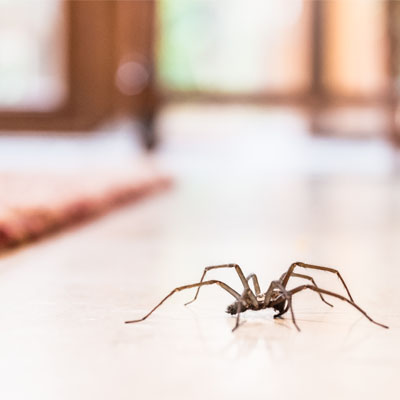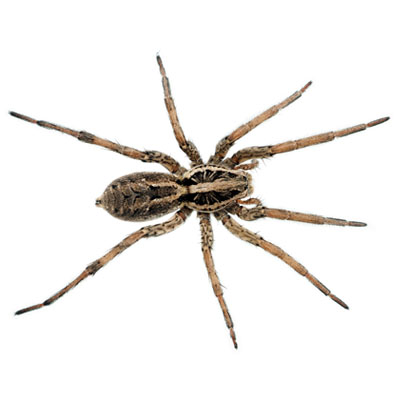When the weather gets cold, spiders have two options for survival:
- Option #1 – Spiders can produce a compound that builds up their tissue and lowers the rate and temperature at which they freeze. This aids in outdoor winter survival.
- Option #2 – This one is preferable to the spider, and much less preferable for us… And that is to seek shelter, food, and warmth. And where is the perfect place they can find all these things? Inside your home.
Do you need help getting rid of spiders and other pests? Work with certified professionals today and prevent an infestation from getting worse.
Thankfully, you can be ready with solutions to eliminate spiders and other pests in your home.
Thankfully, you can be ready. Here are 4 common house spiders you might see this winter, and how you can identify, and prevent them from coming back.
American House Spider (Parasteatoda tepidariorum)
This species is a common house spider in Massachusetts. They are commonly found in basements, sheds, and garages, as they prefer to hide in dark places with plenty of cover. They aren’t dangerous to humans but they can bite if they feel threatened. Thankfully, the bites aren’t venomous (but they will sting!)
You can identify these spiders by their bulbous figure, along with black and/or white spots and lines. They spin cobwebs that look similar to what you’d see as a Halloween decoration. The best way to prevent these spiders from living in your home is to limit potential hiding spaces, and deep clean any infested areas (vacuum, soap, and water).
Daddy Long Legs (Pholcus phalangioides)
These spiders look to make their habitat where it is dark, and damp. Basements, bathrooms, and under cabinets are common areas. Contrary to some myths, these spiders are not venomous and generally try to avoid contact with humans.
They are one of the easiest spiders to identify, as their legs are usually 5-6 times the length of their body. The best way to prevent these spiders is to make sure there is no unnecessary moisture anywhere inside or outside your home. Also make sure there is no loose trash, debris, or wood as these things attract daddy long legs (and other critters too).
Brown Recluse Spider (Loxosceles reclusa)
These spiders are extremely shy and do everything they can to avoid human contact. They prefer to nest in dry, secluded areas where there is plenty of cover.
The Brown Recluse spider is not a common house spider in Massachusetts. But if you spot them, they appear brown, and can be easily identified by what looks like a violin on their back. They are venomous but will only bite if necessary. The best way to prevent these spiders is to hire a professional pest control company. However, eliminating favorable living conditions will help.
Wolf Spider (Lycosidae)
The wolf spider will be one of the biggest ones you see in your home. They are usually brown, and sometimes have black/gray coatings. Their eyes best identify them, as they have a bottom row of 4 small eyes, with 2 bigger eyes above, and the 2 biggest eyes on top of their head. They are most likely to be seen near doors and windows.
The wolf spider is venomous, but not dangerous to humans. The most effective way to prevent wolf spiders is to make sure all cracks in your windows and doors are sealed. Glue traps may also be effective.
Geographical Distribution of Common House Spiders
House spiders are found across various regions, with some species more prevalent in specific areas than others. Understanding where these arachnids can be found helps homeowners and businesses anticipate and identify potential infestations:
- Northeastern United States: In regions like Massachusetts, common spiders in houses include the American House Spider, Long-Bodied Cellar Spider, and Wolf Spider. These are among the most common house spiders, well-suited to the cooler climates, and often found in basements and attics.
- Southern and Western United States: Warmer climates are home to types of house spiders like the Black Widow and Brown Recluse, which are less common in Massachusetts but can be found in other regions. These species seek out undisturbed areas like garages, sheds, and wood piles.
- Urban vs. Rural Settings: Some common house spider types prefer rural areas, where food sources like insects are abundant. In contrast, others thrive in urban settings due to the warmth and protection of indoor environments.
Common Behavioral Patterns of House Spiders
Different types of house spiders exhibit unique behaviors that can provide insight into where they are likely to be found and how they interact with their environments.
- Feeding Habits: Many spiders are beneficial because they help control other pests. They feed on insects such as flies, ants, and tiny moths, making them natural pest controllers within homes.
- Web-Building Patterns: Certain species, such as the American House Spider, are known for building messy cobwebs in undisturbed corners of homes. Conversely, other common spiders in houses, like Wolf Spiders, are not web builders but active hunters.
- Hiding Preferences: Spiders often seek out dark, undisturbed areas. Long-bodied cellar Spiders, for instance, prefer damp basements or closets. At the same time, Jumping Spiders might be found near windows or in well-lit areas where they hunt actively.
These behaviors vary slightly by species and location, especially with common house spider breeds in Massachusetts. These species tend to seek indoor warmth during the winter months.
Understanding the Health Risks of Common House Spiders
Although most common house spiders are harmless, some may cause mild reactions if handled or provoked. Knowing which spiders pose potential risks can help maintain a safe home environment.
- Low Risk to Humans: Most spiders, including the types of house spiders common in Massachusetts, are not dangerous.
- Mild Reactions to Bites: While uncommon, spider bites can sometimes cause minor irritation. Like the Long-Bodied Cellar Spider, common spiders in houses might occasionally bite if threatened, resulting in mild redness or itching, similar to a mosquito bite.
- When to Seek Medical Attention: Although rare, certain house spiders, like the Black Widow or Brown Recluse, should be taken seriously. In case of a bite with severe symptoms such as swelling, muscle cramps, or difficulty breathing, immediate medical attention is recommended.
By recognizing and understanding the most common house spiders and their behaviors, homeowners can hire certified professionals for one-time services or quarterly pest control programs to deal with house spiders.
At Pest Control Unlimited, we understand these spiders and their desire to make your home their home. That’s why we developed our winter pest control treatments for residents of Massachusetts and New Hampshire to ensure these pests stay where they belong… OUTSIDE. Give us a call today at 888-649-9919 or contact us through our online form to let our trained professionals help you!

